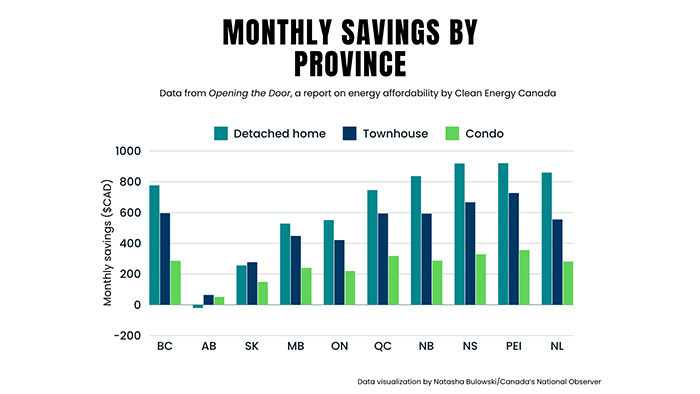
Natasha Bulowski,
Local Journalism Initiative Reporter
Installing a heat pump or switching from a gas to electric vehicle can save households money in every clean-energy scenario in every province — except in Alberta, according to a new report from Clean Energy Canada.
“Switching a fossil fuel-powered car for an EV saves money in every region of the country, in every scenario we looked at, even when upfront costs are included,” Rachel Doran, Clean Energy Canada’s vice president of policy and strategy, told Canada’s National Observer in a phone interview. The nonprofit’s new analysis, published Oct. 16, breaks down the cost savings from taking a suite of actions — including heat pumps, retrofits, electric vehicles and more.
Even in provinces with less generous electric vehicle rebates, buyers save so much on fuel and maintenance over time that over the average lifetime of your vehicle, they easily make up for that potentially higher upfront price, Doran explained.
“When you’re charging your car with electricity, you’re actually paying the equivalent of 40 cents per litre of gas to charge your car. That’s less than people paid at really cheap rates in the 1990s,” Doran noted.
“How we do math on things like energy prices is really critical, and as technology evolves, we’re getting the best of both worlds; it’s best for pocketbooks and for the planet.”
The new report includes provincial breakdowns of monthly savings from switching to a heat pump, EVs, and other clean energy upgrades, like electrifying hot water systems and making homes more airtight. The savings vary for detached homes, townhouses and condos, but in all except one scenario in one province, households are saving money in the long run by making these upgrades.
“Installing a heat pump and going all electric in your home saves you money in most provinces, even when the costs are taken into account,” Doran said.
The only scenario to yield no cost savings was for detached homes in Alberta, which came out $21 in the red.
Doran explained that Alberta, unlike other provinces, has not made investments to support electrification, leading to the sole example of a net money loss.
“There’s no upfront rebates to be considering either on heat pumps or on electric vehicles and … it’s one of the dirtiest grids in the country, and highest electricity rates,” she said.
“There really hasn’t been any effort to help the citizens of Alberta benefit from what are increasingly available and affordable options due to the energy transition.”
Saskatchewan, the Northwest Territories and Nunavut also do not have a provincial or territorial heat pump rebate. Saskatchewan households still come out ahead with $256 savings for a detached home. The report did not crunch the numbers for the Northwest Territories, Nunavut or Yukon.
“The playing field right now is not very level across the country,” Doran said. A person in B.C. is able to access up to $12,000 of rebates that somebody in Ontario isn’t going to be able to access, she pointed out. The federal government recently discontinued a $5,000 rebate to help Canadians switch to heat pumps or do other energy efficient retrofits and intends to replace it with a new energy-efficient grants program for low-income households and tenants. Some provinces, particularly Nova Scotia and PEI, have excellent heat pump rebates for lower-income homeowners.
Overall, Nova Scotia, PEI and Newfoundland and Labrador see the biggest benefits.
Different regions rely on different fuels, which changes the math. Homes in Nova Scotia and PEI rely on costly and carbon-intensive heating oil, so switching to a heat pump saves a lot of money. Similarly, exchanging “really inefficient” electric baseboard heating in Quebec, New Brunswick or Newfoundland and Labrador for a heat pump “is going to make a huge difference,” Doran said.
Clean Energy Canada has an online tool that calculates cost savings and planet-warming greenhouse gas emission reductions based on geography, number and type of vehicles and home.
Doran manages her family finances and her mindset has shifted to doing math with a business outlook: “I may pay a little bit more upfront, but I’m going to save more in the long run.”
Seen differently, the math can also tell us the cost Canadians are incurring every month without switching off fossil fuels.
The research “definitely shows there’s lots of room for different levels of government to act” — like the provincial rebates on offer, Doran said. To go further, the report recommends that governments also create energy efficiency standards for buildings, improve electricity rate design and fund retrofits so apartment dwellers can charge EVs.
Natasha Bulowski,
Local Journalism Initiative Reporter
Canada’s National Observer




